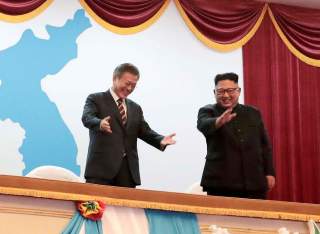North Korea and America’s Second Summit: Here’s What Joe Cirincione and Catherine Killough Think Will Happen
"If the Trump administration could secure anything close to the Agreed Framework, it would be a huge step forward. But the costs have increased now that North Korea boasts a sizable nuclear arsenal."
Editor’s Note: Want more ideas on what will happen at the summit? Check out all 76 expert opinions we gathered here.
Much of the worry over the second U.S.-North Korea summit has to do with President Trump rather than Kim Jong-un. It is Trump’s recklessness rather than Kim’s stubbornness that threatens this nuclear diplomacy. Will Trump concede too much, or declare victory too soon? Will this be just another photo op?
U.S. intelligence agencies conclude that North Korea is unlikely to give up its nuclear weapons, as it sees them as key to the regime’s survival. We agree. But can we change their security calculus? Maybe. Former Commander of UN and U.S. Forces in Korea Vincent K. Brooks, believes Kim may be serious about reducing his nuclear force. He “has moved in a different direction,” Brooks told the PBS NewsHour. “Can trust be built sufficiently to overcome so many decades of distrust and expectation of failure? That’s the challenge that is ahead right now.”
U.S.-North Korea relations have been a tinderbox for decades—one that President Trump came dangerously close to igniting in 2017. Too much of our policy has been uninformed or superficial. We kicked the nuclear can down the road for far too long and failed to prioritize diplomatic solutions to the problem. Now it is in the hands of one of the most irresponsible presidents in American history.
There were some past successes, and the Trump administration could learn from them. President Bill Clinton forged the 1994 Agreed Framework, a landmark nuclear deal that froze North Korea’s plutonium production and prevented it from making as many as 100 nuclear weapons over 8 years. John Bolton killed it, using North Korea’s secret research into uranium enrichment as the excuse. “This was the hammer I had been looking for to shatter the Agreed Framework,” Bolton bragged.
If the Trump administration could secure anything close to the Agreed Framework, it would be a huge step forward. But the costs have increased now that North Korea boasts a sizable nuclear arsenal. Washington must be prepared to deal, and deal hard. It can start by testing Kim’s goals. Does he seek, as Gen. Brooks believes, “a completely new set of relationships in Northeast Asia,” most especially with the United States? We must test this with dialogue and serious security guarantees. This may be our last best chance. “Without conversation,” says Brooks, “we go right back to where we were in 2016 and 2017, with the great potential of miscalculation on one another's actions.”
Joseph Cirincione is president of the Ploughshares Fund, a global security foundation.
Catherine Killough is the Roger L. Hale fellow at the Ploughshares Fund.
You can follow them on Twitter at @Cirincione and @CatKillough.
Image: Reuters


